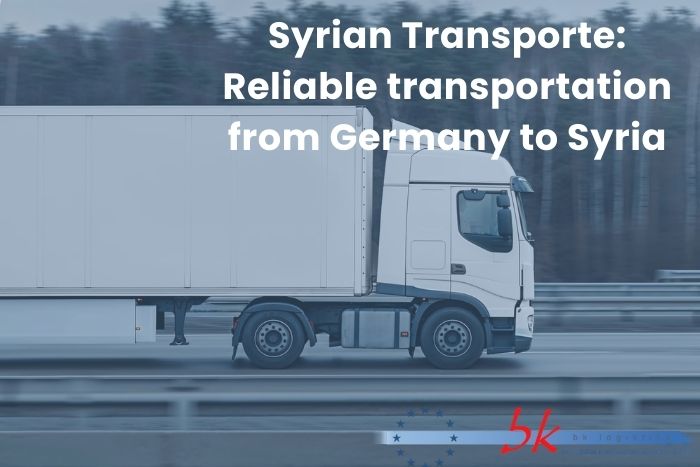News
Syrian Transporte: Reliable transportation from Germany to Syria
Table of contents
- Introduction to transport from Germany to Syria
- Various transport options for shipping to Syria
- Requirements and regulations for transport to Syria
- The process of transport from Germany to Syria
- Ensuring reliable transport to Syria
- Frequently asked questions about transport to Syria
Introduction to transport from Germany to Syria
Transport from Germany to Syria is an important aspect of international trade and logistics, especially at a time when the global economy is increasingly reliant on efficient and reliable supply chains. Due to Syria's geopolitical location and the economic challenges the country faces, transportation to this country requires specific expertise and careful planning. Companies wishing to export goods to or import from Syria must be aware of the applicable regulations and logistical challenges.
In practice, this means that companies not only have to choose an appropriate mode of transport, but also ensure that they are familiar with the political and legal framework. This includes, for example, sanctions, customs regulations and the need to obtain certain authorizations for transport. Selecting a reliable and experienced logistics partner who is familiar with the specific requirements of the Syrian market is therefore essential to ensure a smooth transport process.

Various transport options for shipping to Syria
There are several transportation options that can be considered for shipping goods from Germany to Syria, and each of these options has its own advantages and disadvantages. Choosing the best method depends on various factors, including the type of goods being transported, budget, delivery time and the safety of the cargo. The most common means of transport include land transport, sea freight and air freight.
Land transport:
Land transport via truck is one of the most commonly chosen options as it represents a direct and often more cost-effective solution. The goods are transported through several countries to get to Syria. The biggest advantage of ground transportation is its flexibility, as it typically has fewer restrictions on the type of cargo and delivery times. However, land transport can be complicated by political unrest, border controls and infrastructural challenges.
Seefracht:
Sea freight is another common option that is particularly suitable for larger quantities of freight. However, this method requires more precise planning as the ships must navigate long distances and through multiple bodies of water to reach Syria. Although sea freight offers the advantage of a cost-effective solution for large quantities, it can also involve longer transport times and requires careful logistics.
Air freight:
For particularly valuable or time-critical goods, air freight is one of the fastest options. This method guarantees fast and safe transport, but usually has higher costs and is less practical for larger quantities. Air freight is particularly suitable for sensitive or high-priced goods that require special handling. Although air freight allows for quick transportation, companies also need to ensure they are familiar with the necessary export and import regulations.
Requirements and regulations for transport to Syria
Transporting from Germany to Syria requires a good understanding of the relevant regulations and requirements that apply to international trade and logistics in this region. One of the biggest challenges with this transport route is the numerous legal framework conditions that have to be taken into account both in Germany and in the transit countries and in Syria itself.
Companies must ensure that they provide all necessary export and import documents, including commercial invoices, customs documents and, if applicable, special permits required for exporting to Syria. Due to the international sanctions imposed on Syria, it is particularly important that transport complies with all necessary regulations to avoid legal problems. In addition, companies must take into account the specifics of customs clearance in Syria, as this may differ from the usual procedures in other countries.
The process of transport from Germany to Syria
The entire transport process from Germany to Syria includes several phases that must be carefully planned and coordinated. First, all necessary documents and permits must be obtained in order to legally transport the goods across the borders. Choosing the right transport company that is familiar with the specific requirements of the Syrian market is crucial to ensure that transport is carried out efficiently and without delays.
After the goods are ready for transport, the physical transport begins, which can include different routes and intermediate stops depending on the chosen means of transport. For example, land transport involves passing through many different border crossings, which can involve additional security measures and documentation requirements. Transportation by sea or air also requires thorough planning and regular checks on the safety and condition of the cargo.
Once the goods have arrived in Syria, they must go through customs clearance, taking into account possible delays due to security arrangements or other administrative requirements. An experienced logistics partner ensures that the entire process runs efficiently and that the goods arrive at their destination quickly and safely.
Ensuring reliable transport to Syria
Choosing a reliable shipping partner is crucial when it comes to shipping to Syria. Due to the political instability in the region and the complex logistical challenges, transport to Syria requires a partner who is familiar with the local conditions and has the necessary expertise to minimize possible risks. Companies should therefore ensure that their logistics partner has experience in the region and in handling shipments to Syria.
Another important aspect is choosing the right security precautions. Since transport to Syria also poses security risks, companies must ensure that their goods are well protected throughout the journey. This means that appropriate insurance should also be taken out to cover damage or loss during transport.
Frequently asked questions about transport to Syria
When transporting goods to Syria, many companies often ask themselves similar questions. One of the most common questions concerns the duration of the transport and the various factors that can influence it. Transport may vary due to political or administrative delays or difficulties at border crossings. As a rule, transport from Germany to Syria takes several weeks, depending on the transport option chosen and the specific route.
Another common concern concerns the cost of transportation. These may vary depending on the mode of transport and the specific requirements of the shipment. While land transportation is typically cheaper, air freight and ocean freight can be more expensive depending on the size and urgency of the shipment. It is therefore important to receive a detailed cost breakdown in advance.
Finally, many companies also ask about the possible risks of transport to Syria. In fact, transportation to this country involves certain risks, particularly in terms of security and the political situation. However, it is possible to minimize these risks by working with an experienced logistics partner and taking appropriate precautions to protect the goods and avoid delays.



